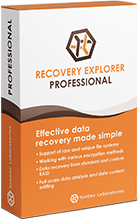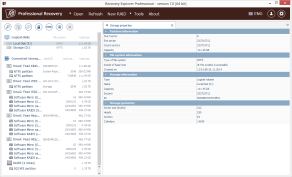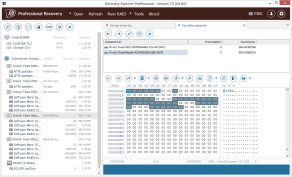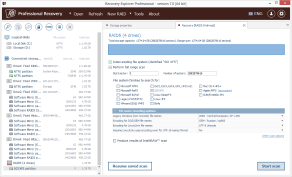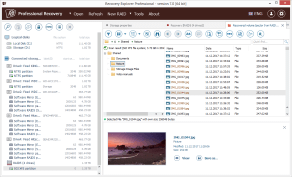Recovery Explorer Professional

Recovery Explorer Professional is a profound software solution complemented with a toolkit equal to data recovery tasks of advanced complexity: work with specific storage technologies, RAID and RAID-based systems, encrypted disks or virtual machines, including the analysis of their raw content in a hexadecimal mode and correction of logical errors. The application makes every intricate operation incredibly easy and smooth, serving as a handy assistant for experienced computer users who are apt to face non-typical data loss situations.
Sufficient to manage trickiest data recovery cases

deletion

corruption

formatting
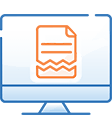
crashes

attacks

defects
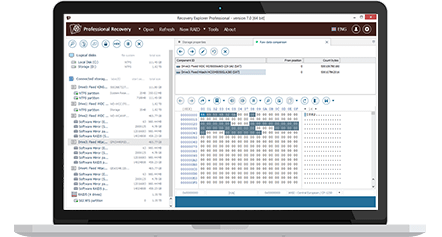
- PCs/laptops
- Hard disk drives
- External USB disks
- USB flash drives
- Memory cards
- Music players
- Digital cameras
- RAID sets
- NAS devices
- Servers
- SAN systems
- Other storage devices
 Documents
Documents Images
Images
 Audio files
Audio files Videos
Videos
 E-mails
E-mails Any other file format
Any other file format
Key features
The program is capable of dealing with a broad set of storage units, inclunding ones implementing the latest technologies, like Windows Dynamic Disks and Storage Spaces, Apple Software RAID and Fusion Drive, Linux mdadm, LVM with Thin Provisioning, Btrfs-RAID, ZFS RAID-Z, Drobo BeyondRAID, Synology Hybrid RAID and other configurations.
The application comprises effective techniques that allow it to open the available content and recover the lost or deleted data from various file systems of Windows (FAT/FAT32/exFAT, NTFS and ReFS/ReFS3), macOS (HFS+, APFS), Linux (Ext2, Ext3, Ext4, SGI XFS, JFS, ReiserFS, Sun ZFS, Btrfs, F2FS), BSD/Solaris (ZFS) and VMware (VMFS, VMFS6). Furthermore, the utility provides access to volumes with the legacy Apple HFS file system, HPFS of IBM/Microsoft, Novell NetWare (NWFS) and Novell Storage Services (NWFS, NSS, NSS 64) file systems.
Enhanced with a comprehensive toolset for work with RAID, Recovery Explorer Professional is an optimal choice for the tasks of data recovery from RAID and RAID-based storage devices. Supporting various levels of RAID, including standard RAID patterns (like JBOD, RAID 0, RAID 1, RAID 1E, RAID 3, RAID 4, RAID 5 and RAID 6), nested levels (RAID 10, RAID 50, RAID 60, RAID 50E) and custom RAID configurations, the software can detect the metadata on drives for the automatic RAID reconstruction and allows assembling RAID manually in a virtual mode.
Recovery Explorer Professional contains mechanisms that allow it to decipher encrypted disk volumes without running the operating system or specialized software (on the condition that the encryption key is known). The program supports many encryption technologies , including BitLocker, LUKS (1, 2), TrueCrypt, VeraCrypt, FileVault 2, APFS encryption and eCryptFS.
Along with “real” storage devices, the software is able to process virtual disks of different virtual machines, among which is VMware, Hyper-V, VirtualBox, QEMU, XEN and others. Moreover, a virtual disk nested on another physical or even virtual storage can be extracted and opened directly in the program for further operations as if it was an ordinary physical drive.
Recovery Explorer Professional presents a special assembly of tools for maximally convenient analysis of the raw data of storages, partitions, files or their fragments and correction of the logical errors. With their help one can easily trace the allocation of data through reverse address translation, compare the content of different storages, perform the parallel search of hexadecimal patterns, calculate parity, combine disk image chunks and perform numerous other manipulations.
The software allows selecting the mode for access to the storage device and defining a timeout that will be used in case its reading won’t succeed due to an I/O error. What is more, an “on-demand” imaging option makes it possible to save the accessed data to a sparse image file, avoiding excessive pressure on the storage caused by multiple read requests to the same location. Also, with an embedded S.M.A.R.T. monitor, it is much easier to keep an eye on the “health” condition of questionable drives.
The program offers several scanning options: a quick scan for chosen file system types, a longer profound search for lost data by known content with the possibility to define custom IntelliRAW rules, scanning of the space occupied by the file system or just the “free space” areas. The scanning procedure can be paused anytime while its results can be saved for further references after the software restart.
The software is complemented with a variety of auxiliary possibilities, like creating a basic disk image of a storage, previewing files of most common formats, including images and documents, sorting them by different criteria, performing a quick search for files/folders or an advanced one with masks for the name, size and last modification date.
What's New in Version 10.6
- Added support of password-based full-disk encryption on OpenBSD softraid;
- Added support of OpenBSD softraid (RAID0, RAID1, RAID5, Span);
- Microsoft Storage Spaces:
- Added basic support of multi-tier volumes with several rotation groups;
- Fixed parsing issue of 'parent link' metadata entries (version 2);
- Added a tool to open 'directory-bundled' images from a local file system:
- Added support of macOS sparsebundle/backupbundle format;
- Added support of Parallels HDD bundle virtual disks (with automatic support of snapshots);
- In media manager: added recognition of local Parallels Desktop virtual machines and possibility to access their virtual disks (under macOS);
- Disk images of Parallels Desktop software: added support of snapshots;
- Fixed scan issue that caused incorrect file system sub-trees reconstruction on Linux/Unix file systems (EXT, XFS etc.).
Frequently asked questions
-
You can download the free Trial version of Recovery Explorer Professional from this webpage and use it to make sure that the product corresponds to your requirements. The trial software will present all the recovered data and allow copying files with a size of less than 768 KB. Copying bigger files requires activation of the software license.
-
UFS Explorer Professional Recovery may serve as a perfect alternative to Recovery Explorer Professional for specialists in the field of data recovery. Please refer to the comparison page to find out the difference in the functional capabilities of these product editions and decide which of them is a better match to your needs.
-
A license should be selected in accordance with the intended use of the software. The Personal License can be used by a single individual only for personal or educational purposes on home PCs or one computer at work. The Corporate License can be used on up to ten computers owned by a legal entity, company or organization for corporate non-profit or educational purposes. The Commercial License can be used on one computer owned by a legal entity, company or organization for commercial purposes and providing services. For more detailed information please refer to the software license page.
-
The license for the software will be provided after a one-time payment of the corresponding license fee. To place an order use the "Buy License" button on this webpage or the "Order license" button from the "Software Activation and License" dialog in the software interface. Choose the needed license type and the operating system you are going to use for the installation of the software. Please note that a single license is applicable for a specific version of the product for one operating system (e.g. Windows OS, both 32-bit and 64-bit) and running the software in other environments requires activating different software licenses. Press "To Checkout" and fill out the billing form. The information needed for the purchase includes first name, last name, address, city, country and email address. All the data and the transaction will be securely processed by our sales partner 2Checkout according to the market security standards.
-
Our sales partner 2Checkout provides a variety of payment options, including Visa/MasterCard, PayPal, American Express, Discover, WebMoney, wire transfer, etc. and allows performing the payment in any currency. For more details, please, visit the global payments page on their website.
-
A Registration Code is issued to either the person's (entrepreneur’s) name or company's name once the payment is processed and is delivered to the email address specified in the order. The delivery is electronic and usually takes about 15-45 minutes.
-
A Registration Code will be sent to the email address specified in your purchase order. To activate the license, download a free Trial version of the software and enter your name with the Registration Code from the email in the "Software Activation and License" dialog.
-
Download the updated version of Recovery Explorer Professional from this webpage and follow the steps of "fresh" software installation. Alternatively, you can do that by following the prompts in the software interface.
Other Recovery Explorer products
-
NTFS, FAT, FAT32, exFAT, ReFS/ReFS3;
-
HFS+, APFS;
-
Ext2, Ext3, Ext4, XFS, Extended format XFS, JFS, ReiserFS, UFS, UFS2, Adaptec UFS, big-endian UFS, Btrfs, F2FS;
-
ZFS;
-
VMFS, VMFS6.
-
NTFS:
full support: data access, search for lost partitions, RAID recovery, recovery of deleted files, recovery after formatting and file system damage. -
FAT/FAT32/exFAT:
full support: data access, search for lost partitions, recovery of deleted files, recovery after formatting and file system damage. -
ReFS/ReFS3:
full support: data access, search for lost partitions, RAID recovery, recovery of deleted files, recovery after formatting and file system damage. -
XFS:
full support: data access, search for lost partitions, RAID recovery, recovery of deleted files, recovery after formatting and file system damage; support of NAS devices and custom servers. -
Linux JFS:
full support: data access, search for lost partitions, RAID recovery, recovery of deleted files, recovery after formatting and file system damage. -
Ext2, Ext3, Ext4:
full support: data access, search for lost partitions, RAID recovery, recovery of deleted files*, recovery after file system damage; support of NAS devices and custom servers. -
ReiserFS:
full support: data access, search for lost partitions, RAID recovery, recovery of deleted files, recovery after formatting and file system damage. -
Apple HFS+:
full support: data access, search for lost partitions, RAID recovery, recovery of deleted files*, recovery after file system damage. -
APFS:
full support: data access, search for lost partitions, RAID recovery, recovery of deleted files*, recovery after file system damage. -
UFS/UFS2, Adaptec UFS:
data access, search for lost partitions, RAID recovery for both little-endian and big-endian variations, recovery after file system damage, very limited support of deleted data recovery. -
Btrfs:
data access, RAID recovery; support of hardware RAID, mdadm RAID, Btrfs-driven RAID. -
F2FS:
full support: data access, search for lost partitions, RAID recovery, recovery of deleted files, recovery after formatting and file system damage. -
Sun ZFS:
data access and data recovery from simple and stripe ZPOOL, limited support of lost data recovery; support of RAID-Z. -
VMware VMFS:
data access, RAID recovery; very limited support for virtual disk recovery.
-
HFS;
-
NWFS, NSS, NSS64;
-
HPFS.
-
HFS:
only data access (copying files and folders from the HFS file system). -
IBM/Microsoft HPFS:
only data access (copying files and folders from the HFS file system). -
VMFS6:
data access, RAID recovery, very limited support for virtual disk recovery. -
Novell NWFS:
data access, RAID recovery (copying files and folders from the NWFS file system). -
Novell NSS:
data access and RAID recovery (copying files and folders from Novel Storage Services). -
Novell NSS64:
data access and RAID recovery (copying files and folders from Novel Storage Services).
-
Composite volumes: mdadm, LVM, LDM, Apple Software RAID, Intel Matrix;
-
Most standard RAID patterns: RAID 0, RAID 1E, RAID 3, RAID 4, RAID 5, RAID 6, etc.;
-
Nested (Hybrid) RAID levels: RAID 10, RAID 50, RAID 60, RAID 50E, etc.;
-
Non-standard RAID: Drobo BeyondRAID, Synology Hybrid RAID, ZFS RAID-Z, Btrfs-RAID, Dell EqualLogic Storage Arrays;
-
Custom RAID patterns: via RAID Definition Language or Runtime VIM.
-
Encryption technologies: BitLocker, FileVault 2, APFS encryption, LUKS (1, 2), TrueCrypt, VeraCrypt, eCryptFS;
-
Virtual disks and disk images: VMware (VMDK), Hyper-V (VHD/VHDX), QEMU/XEN (QCOW/QCOW2), VirtualBox (VDI), Parallels (PVM), Synology Sparse iSCSI, EnCase (E01 and Ex01 non-encrypted), Apple Disk Images (DMG), disk images of DeepSpar DDI, R-Studio image files (RDR), simple disk images;
-
Other storage technologies: Microsoft Storage Spaces, Apple Core Storage, Fusion Drive, LVM/LVM 2 with thin provisioning.
-
Tools for low-level data analysis: hexadecimal viewer (for storages, partitions, files, file fragments), hexadecimal editor (for disks and partitions), field highlighting, data interpreter, parity calculator, reverse data address translation, data comparison tool, bitwise "exclusive OR" (XOR) function, parallel search, view of file fragments with virtual offsets and sizes, indication of used file system space;
-
Features for work with damaged disks: configurable drive reading procedure, read-once disk access with saving of processed data, basic disk imager, S.M.A.R.T. monitor for drives, event log;
-
Auxiliary options: files preview, search, sorting, filtering and others.
-
The software will copy files the size of which doesn’t exceed 768 KB;
-
The "Save" function is disabled in certain hexadecimal viewer/editor dialogs.
Microsoft Windows ®: starting from Windows® XP with Service Pack 3 and later;
macOS: all versions starting from 10.15;
Linux: Debian Linux 6.0 (or compatible) and above.
Intel Architecture, 32-bit (IA-32, x86);
AMD64 (x86-64).
Any of the supported host operating systems;
at least 20 MB of free space on the disk for the executable files of the software;
at least 1 GB of RAM;
the Linux software version can run from most modern Linux Live CDs.
A 64-bit edition of any of the supported host operating systems;
over 1 GB of free space on the disk for the program and temporary files;
at least 2 GB of RAM and 4 logical cores CPU;
default web browser.
